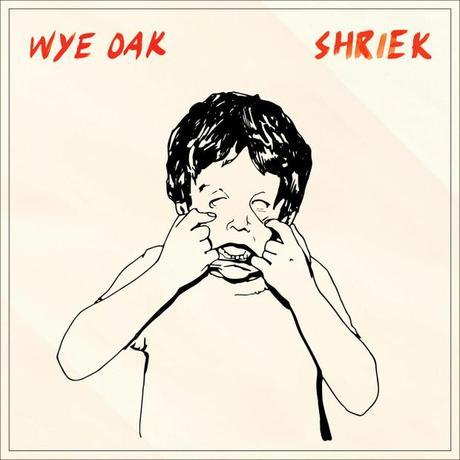
For those who’ve closely monitored Wye Oak’s eight years long career, were most likely taken aback when lead-singer Jenn Wasner’s told SPIN in a late 2013 interview that there won’t be a single guitar lick on Shriek, the bands fourth album. I certainly was, but mostly in a good way. At least that’s what brilliant early singles “The Tower” and “Glory” had me believe. Especially the pulsating off-beat synths of “The Tower” felt like a warped extension of Supertramp’s major 1979 hit single “The Logical Song”. And even better is the album’s recently teased title track with its arpeggiated synth chords playing in divine synchrony with Wasner’s angelic vocals.
“Shriek”, “The Tower” and “Glory”, together with the spluttering, staccato bass play of near flawless album opener “Before”, presents Shriek as a fresh and blossoming take on synth-pop. And on these back-to-back tracks on the A-side, Wasner’s voice immediately steals the show. Her vocals and melodic acuity are strained to their fullest potential, altering between light angelic touches and confident up-beat tones that are undoubtedly broader in range and more purposeful than on Civilian. And in the end, her vocals serves as the albums most obvious epiphany.
While Shriek largely secure Wye Oak’s transition from mostly sullen and relatively basic guitar rock to confidently embracing synthesizers as the main catalyst for creation, far from everything on the album sounds as spot-on and dynamic as these four tracks. The largely fine “Sick Talk” finishes of the first half, but unfortunately the record largely runs out of air shortly after that. Tracks like “Paradise” and “Despicable Animal” are half-baked exercises in tried-and-tired dream-pop textures, almost boring themselves into a sudden halt. It unfortunately leaves the second half as a rather stale exercise in ambiance – and perhaps a naïve joy of toying with keyboards – at the expense of good ideas and melody.
For a band that felt discontent and bored with their old material, a change was perhaps inevitable and more importantly, admirable. Past parallels can be drawn to Young Galaxy, a former new wave inspired indie-pop band, who went electronic on last year’s solid Ultramarine. And likewise, Wye Oak’s decision to shelve guitars for synthesizers is actually a good one. I liked the old Wye Oak, but the potential laid-bare on the first half of this record is enormous; the problem is that Shriek feels like an unfinished work. But if they can manifest their newfound love for electronics into cohesive future efforts, I’m sure we’ll look back at it as a necessary and decisive leap of faith.

